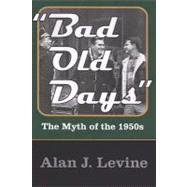
Note: Supplemental materials are not guaranteed with Rental or Used book purchases.
Purchase Benefits
Looking to rent a book? Rent Bad Old Days: The Myth of the 1950s [ISBN: 9781412807456] for the semester, quarter, and short term or search our site for other textbooks by Levine,Alan J.. Renting a textbook can save you up to 90% from the cost of buying.
| The Myth and the Problem | p. 1 |
| The Post-World War II Era: Its Characteristics, Achievements, and Problems | p. 7 |
| Race: The Great American Obsession | p. 29 |
| The Myth of McCarthyism | p. 41 |
| Prosperity and Poverty in the Postwar Era | p. 55 |
| Men and Women | p. 61 |
| Conformity, the "Silent Generation," Liberalism, and Social Criticism | p. 71 |
| Postwar Culture | p. 89 |
| Seeds of Disintegration? | p. 107 |
| Post-Sputnik "Declinism" | p. 113 |
| Those Suburbs-Suburbia, Disturbia, and the Slurbs | p. 123 |
| Cars: Getting Around, Gorp, and the "Vaginal Look" | p. 141 |
| The Economy and Industry in the Postwar Era | p. 157 |
| Index | p. 169 |
| Table of Contents provided by Ingram. All Rights Reserved. |
The New copy of this book will include any supplemental materials advertised. Please check the title of the book to determine if it should include any access cards, study guides, lab manuals, CDs, etc.
The Used, Rental and eBook copies of this book are not guaranteed to include any supplemental materials. Typically, only the book itself is included. This is true even if the title states it includes any access cards, study guides, lab manuals, CDs, etc.